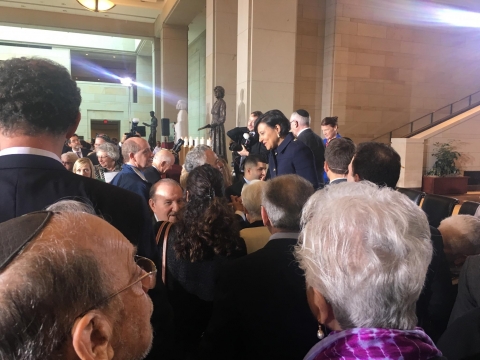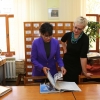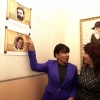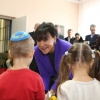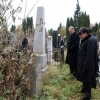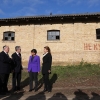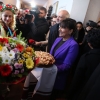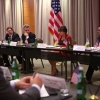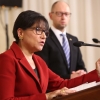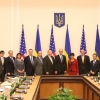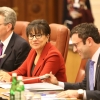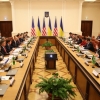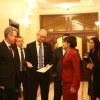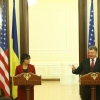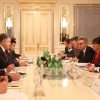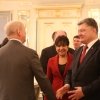May052016
Posted at 2:13 PM
Post by Penny Pritzker Secretary of Commerce
This piece was originally posted on Secretary Pritzker's Medium channel.
Today we remember the unspeakable evil of the Holocaust — a horror that resulted in the murder of men, women, and children throughout Europe, including 6 million Jews, and millions of Roma and others. 6 million is an impossible number to comprehend. We try to intellectualize the quantity, but we cannot begin to grasp the breadth of humanity behind that figure.
And yet we must never forget. Every Day of Remembrance, we come together to try and remember the millions of lives — the sons and daughters, the mothers and fathers, the friends and neighbors — who died in the Holocaust.
For every number a name, and behind every name, a story.
Today, Holocaust survivors share their stories with their children, with their grandchildren, with students, with visitors to the U.S. Holocaust Memorial Museum. Through their words, they ensure those lost are never forgotten.
. . .
I say this so that we can reflect on the point that words have power. We humans have within us the capacity to create realities, good and evil, with speech and with our words.
When a Holocaust survivor speaks about the death of a loved one who perished in the death camps, or in the ghettos, or in the killing fields, she creates a memorial in the minds of all who hear her story.
The inverse is also true. When a Nazi poster placed in the town square says that Jews are a defiler of the race, it strips the Jewish people of their humanity in the minds of all who see it.
Yesterday’s neighbor becomes today’s enemy.
The Holocaust is a lesson about the power of words and language. It is the most extreme example of what happens when we let our hate and fear of the other shape our speech.
. . .
Years before the first concentration camp opened and more than a decade before Kristallnacht, the Nazis began to pollute Europe with their speech and their language. They used hate speech to justify their eventual atrocities.
This happens again and again throughout history. Five decades before the Holocaust, my family fled Ukraine after the Russian Pogroms. Czar Alexander II had been assassinated one month earlier. Rumors spread that Jews were responsible, and riots erupted across Russia. My then-10 year old great-grandfather hid in an attic with his father for more than 60 hours. When the violence had subsided, they discovered their grain store had been destroyed. Fearing for their safety, my entire family emigrated to Chicago later that year.
The pogrom that drove my family out of Czarist Russia was fueled, in part, by a leaflet distributed by the Southern-Russian Workers’ Union. The leaflet said: “One should not beat the Jew because he is a Jew and prays to God in his own way… rather, one should beat him because he is robbing the people, he is sucking the blood of the working man.”
Imagine my great-grandfather’s horror when he traveled to Berlin in 1934 and saw the same bigoted speech spreading across Germany. At the time, he wrote,
“Nazi Germany is merely history repeating itself — the case of the few being used as scapegoats.”
My great-grandfather visited Berlin at almost the exact same time that Nazi hate speech was beginning to translate into state-implemented marginalization of the Jews. If there was ever a time for the German people to stand up against the bigotry of their government, 1934 was it. And yet, most Germans stood idly by and watched as the Nuremberg Race Laws were implemented, effectively purging Jews from German society.
. . .
Speech creates realities, good and evil. And hate speech has a friend in silence.
Most Germans did not murder Jews or the Roma, but every person who knew what was happening in the death camps and chose to go about their lives was complicit in the atrocities.
My dear friend Rabbi Yehiel Poupko calls them “the tribe of folded arms,” and they bear their share of guilt. Silence is dangerous, because it spreads the notion that the problems of your neighbor are not your problems.
We are all familiar with Martin Niemoller’s litany “First They Came for the Socialists.” To this day, many use his words to illustrate that you cannot tolerate discrimination against others, because one day hate will come knocking on your door.
But this litany also underscores the important point that institutional discrimination is gradual.
First, they came for the socialists and the trade unionists. Later, the Jews.
First, you lost your job if you spoke out. Later, you lost your job just for being Jewish.
First, you were moved from your home into the ghetto. Later, years later, you were sent in cattle cars to Auschwitz.
Societies do not move from good to evil overnight. The challenge of the gradual descent into hate is to speak out early enough and loud enough to reverse its course.
. . .
Today, in our beloved United States, we are witnessing a rising fear of the other. The Southern Poverty Law Center (SPLC) recently surveyed teachers across the country about how the rhetoric of this election is impacting their students.
More than two-thirds reported that their students — mainly immigrants, children of immigrants, and Muslims — are worried about what might happen to them after the election. More than a third are seeing more anti-Muslim or anti-immigrant sentiment in their classrooms.
Let me be clear: I do not think a Holocaust is possible in the United States, but I worry about what happens when we betray the principles of inclusion that form the foundation of our country.
Freedom of speech gives us the right to speak our mind. It is a precious right. But it does not free us from responsibility for the consequences of our words. This right should not be used to dehumanize others with language.
As Americans, we have a choice: Do we give in to the language of fear? Do we sit with our arms folded while words are used to dehumanize our fellow human beings?
Or do we stand up and speak out?
. . .
During my great-grandfather’s trip to Berlin in 1934, he and my uncle Jay were eating lunch one day when a group of Nazi supporters, headed by a band, entered the cafe. Tables were pushed together. Fiery speeches were made.
Eventually, one speaker called for a toast to Hitler. Everyone in the restaurant stood up and gave the salute.
Looking at Jay, my great-grandfather said,
“What do we do now? Do we rise?”
Jay, who was only 14 years old at the time, said,
“Grandpa, are we cowards? Then we do not rise nor salute.”
They remained seated.
If my uncle — a teenager visiting a country where the sidewalks were covered in posters proclaiming his people a menace to humanity — had the courage to stick to his principles, what is the excuse for our silence?
My great-grandfather and uncle made silence their dissent at a time when drawing attention to their faith and beliefs was not just unwise but dangerous.
Their silence was powerful. It was justified.
Ours is not.
. . .
All of us live in a country built on the ideals of inclusion and tolerance. We are a country that celebrates the dignity of difference. We are better than the language of hate.
America is NOT the “tribe of folded arms.”
If one of the lessons of the Holocaust is “thou shalt not be silent,” then today, on this Day of Remembrance, we must honor the memories of the millions who were murdered by speaking up against any hate speech we encounter in our lives.
The Torah teaches us,
“You must not go around slandering your fellow human beings. You must not stand idly by when your neighbor’s life is at stake.”
Our neighbors’ lives — their dignity, their humanity — are at stake, and we cannot stand idly by.
Never forget that life and death are in the hands of speech, and may we never forget the stories of the millions singled out for annihilation — the Jewish people, the Roma, and sons and daughters all across Europe — by the unspeakable horror of the Holocaust.
. . .
This piece was adapted from remarks at the Holocaust Memorial Museum’s Days of Remembrance ceremony at the U.S. Capitol on May 5, 2016. Click here to view the video recording on CSPAN.

